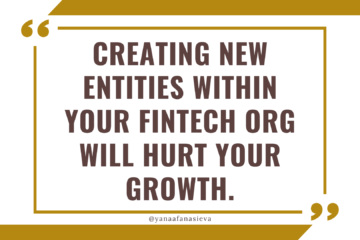PR and FinTech – What Not To Do
Today, I wanted to warn you about some common mistakes that I see in many FinTech marketing communications and public statements (This is already above and beyond the basic requirement not to call yourself a bank of the future or a digital bank or a crypto bank without having a banking license 
1) Making market predictions or offering personal investment advice
- Many startups and especially startup founders are tempted to make market predictions and offer personal investment advice to their audiences. Please, be aware that giving financial advice is a licensable activity and giving such advice without the license is a crime (and can also be problematic from the standpoint of market manipulation laws, especially if you talk about your own coins or the coins listed in your exchange).
- The law in most European countries specifically says that “placing special emphasis on the advantages of one product over others in a way that would tend to influence the decision… could amount to a personal recommendation rather than the mere provision of information”. That is why I suggest you should refrain as much as possible from comments on how the market may behave or what it could mean for your audience.
What is safe to say:
- Quote listings of prices, refer to alerts that certain instruments reached a certain price;
- Company news or announcements;
- Explanation of the terms and conditions of a service or product feature;
- Comparison of the benefits and risks of one option as compared to another, performance metrics of a few instruments or options.
2) Creating self-composed rankings or top-lists
All marketing materials and customer-facing communications must be honest, unbiased, and verifiable. It is possible that for public statements such as “we are the leading company in our niche”, “the fastest…”, “the cheapest…” or any other “the #1 in …” you can be required to produce factual evidence and if the statements are unsubstantiated, it could be interpreted as unfair competition. It is always safer to say “one of the …” or “among the best leading…”.
3) Limit prices or markets or consumer choices
Never speak publicly or privately on any of the following topics:
- Possible divisions of customers, markets, territories, or countries (e.g. bad idea to say “we won’t enter this market because we don’t want to compete with Company X”)
- Say or imply that someone should boycott a product, competitor, vendor, etc.;
- Say that you align your process with the ones of competitors – remember, that you always set prices independently (when Booking.com says they “price-match” it’s not the same – they don’t sell the offers, they place quotes of others on their website)
- Make/participate in non-hiring agreements with anyone
4) About Political Activism
One of the core expectations that customers (and regulators) usually have for financial service providers and similar foundational services is reliability, stability, and resilience. You want these providers to withstand disasters, incidents, changes in political powers, and other shocks, and not get involved in scandals. You want these providers to be focused on their core activities and not get distracted by PR, media, or political controversies.
Engaging in any kind of activism or supporting social movements or selectively accepting or declining customers based on common values or shared aspirations (regardless of how great they may be) makes an organization more vulnerable, more subjective, and less predictable. You are not in the business selling short-lived news, after all, you want customers to stay with you for years to come. Big Tech giants have massive PR teams, resources, and experienced strategists to navigate stormy waters (and even with these resources, we can only imagine how much time and energy it actually takes to make these decisions, review and approve press-releases and consider all pros and cons), but FinTech startups rarely can afford such luxuries.
Amazon is the best company I’ve ever worked for, and I absolutely love and respect it to date as a customer and as an entrepreneur. However, I worked at Amazon during 2012-2014, when media and politicians accused the company (often very unfairly) of not paying enough taxes, putting small businesses out of business, not fostering competition, or not maintaining proper labor conditions, so I know from experience how paralyzing and distractive PR management can be for the company when instead of focusing on the business, everyone from the CEO and CFO to marketing and legal teams is stuck for hours in PR-related meetings.
More recently, I have worked with many opinionated, unconventional, and eccentric startup founders and CEOs (they all really like to talk) and I have plenty of evidence that almost every single controversial interview or public appearance they made, caused delays and challenges with licensing projects, funding rounds, and partnership deals.
If your FinTech startup is in the process of preparing for or applying for a financial license, don’t miss this amazing workshop on FinTech Licensing that takes place on February 23rd and 24th 2021!


